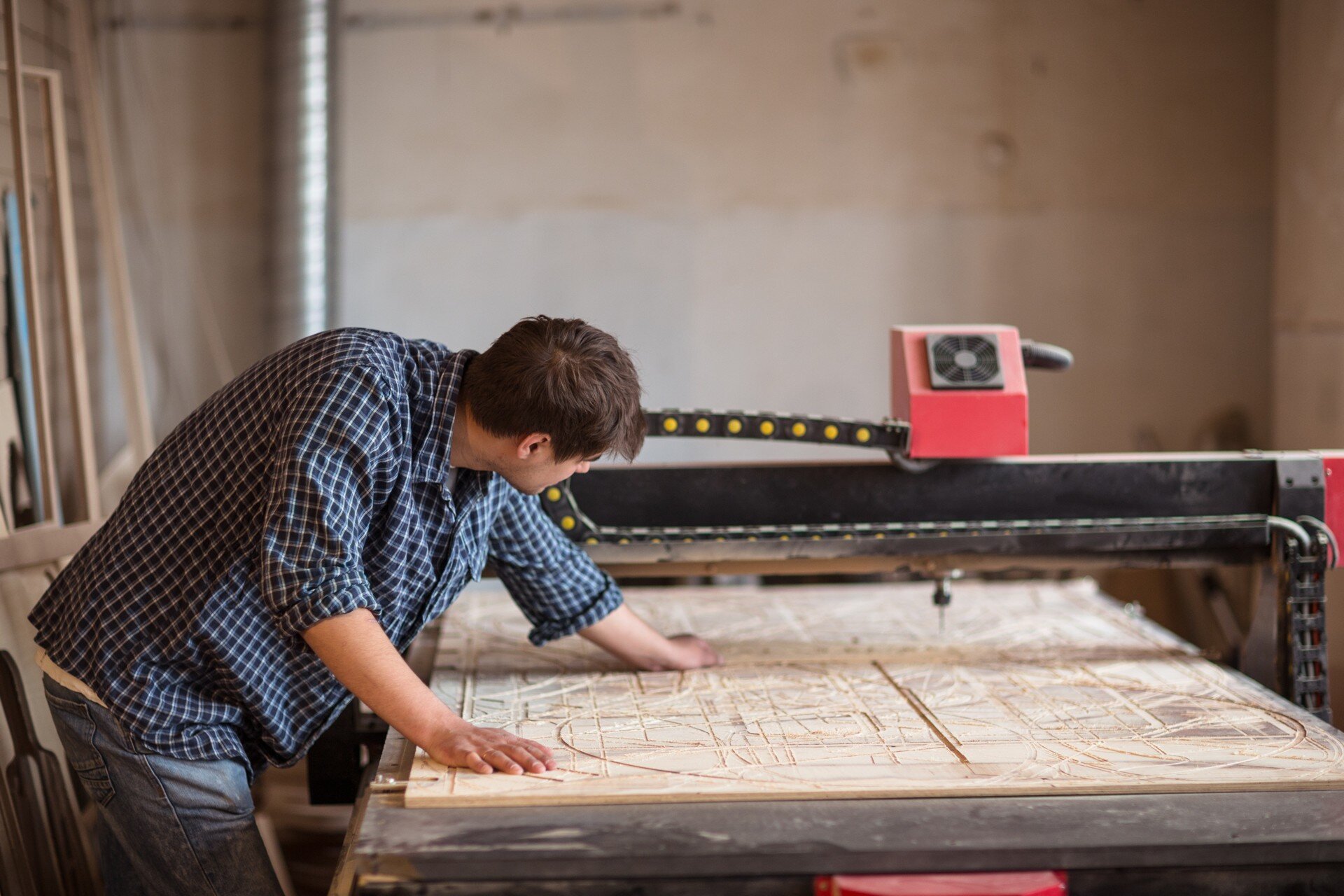Strona 1
Carpenter

The job of a carpenter is one of long‑standing tradition. In the past carpenters dabbled with making and repairing furniture and other pieces of woodwork. These days they mostly manufacture and repair these items... Computerisation and automation make the job of a modern carpenter much easier. It’s also much more efficient thanks to a range of innovative tools.
A good woodworker should be precise, persistent and patient. They ought to have good eye‑hand coordination, attention span and spatial imagination, as well as be familiar with the art of technical drawing. The ability to operate various tools, great computing skills and resourcefulness are also desirable qualities.
A carpenter handles a whole range of varied activities. These are, for example, making objects out of wood or timber products, operating and maintaining machines and devices used in carpentry, as well as repairing, renovating and maintaining woodwork. This means that a carpenter’s professional duties may include making and manually processing wooden elements, as well as mounting and maintaining them. The job also involves the varnishing, staining and painting of woodwork.
Not every carpenter handles the same activities. There are several specialisations within the profession. The difference between them lies in the type of products made and activities performed. These specialisations include, woodworking machine operators, interior carpenters and woodwind makers.
The places of employment or where the work is actually conducted are varied. A carpenter can work in their clients’ homes, carpentry shops, production plants or at institutions that protect and restore cultural heritage. Regardless of the workplace, it is impossible to avoid the exposure to sawdust. Well‑qualified technicians will find employment at construction sites, in companies that manufacture furniture and in carpentry workshops.
Wood technology technician

They work with material that has been present in human life for millenia. It is thanks to them that we have floors and furniture in our homes. They operate modern devices equipped with diamond blades. They say there is nothing that cannot be made of wood. All that refers to no one else but the wood technology technicians whose job, however seemingly unattractive, requires extreme precision and focus. After all, is there anyone who would like to buy a crooked plank or a wooden table with lots of chips on it?
A wood technology technician is a person who professionally performs certain activities that improve the work management within the team. Their main duties include:
- making wooden objects and timber products,
- organising and carrying out works related to repairing, restoring and maintaining carpentry objects,
- setting and operating processing machines and devices used in wood processing,
- drawing up technical documentation,
- participating in designing new technological solutions,
- scheduling production works and drawing up technological charts of new products.
Providing optimum working conditions is essential in the job of a wood technology technician, especially considering the nature of the workplace and binding regulations that apply to a particular workstation, as well as inner OHS procedures. Due to the nature of the job, a wood technology technician can take shifts. However, in order to perform their professional duties, they must be well‑disposed when it comes to individual aptitude and meet certain formal requirements.
While making a decision to become a wood technology technician one should mostly take into account their abilities, character traits, interests, talents, temperament, and physical fitness. A perfect candidate for the job should possess the following skills and character traits:
- technical skills and interests,
- artistic skills,
- well‑developed spatial imagination,
- the ability to work in a team,
- a strong sense of responsibility,
- thoroughness,
- systematicity,
- perceptiveness,
- and composure.
A well‑qualified wood technology technician will find employment in timber industry facilities - sawmills, furniture production plants, companies that manufacture construction timber or wood‑based panels and those that produce timber objects, packaging, and wooden haberdashery.
Mechanic - operator of machines for wood production

The profession of a timber production machinery operator has only recently been officially classified as an occupation upon the request of employers who reported a considerable shortage of workers with vocational education oriented towards this type of skills. This is reason enough to believe that qualified specialists won’t have any problem finding a well‑paid job. A timber production machinery operator can seek employment in companies that manufacture furniture or sawmills. In fact, any facility involved in wood processing such as a boatyard or a carpentry workshop will find themselves in need of hiring a timber production mechanic sooner or later.
A person who wishes to become a timber production machinery operator should, above all, possess well‑developed technical skills. Other desirable qualities are thoroughness, precision, diligence and patience. Spatial imagination and knowledge of wood and its various types is no less important.
Due to the fact that the machines operated by a specialist come in different sizes, a candidate for the job must be prepared to work both indoors and outdoors. The equipment they operate, if used inappropriately, can pose a serious threat to one’s health or even life. That’s why following the OHS procedures in a workplace is of crucial importance.
While processing wood, an operator is exposed to considerable noise, dust, and wood chips and therefore they should wear a hard hat, ear defenders and protective goggles if the nature of the work so requires.
The job of a timber production mechanic is not only profitable, but also gratifying. Wood is great to work with, which is a common opinion shared by those who are professionally involved in its processing. If you are interested in technology and enjoy seeing the effects of your work - you should consider choosing the profession of a timber production machinery operator as a career path.